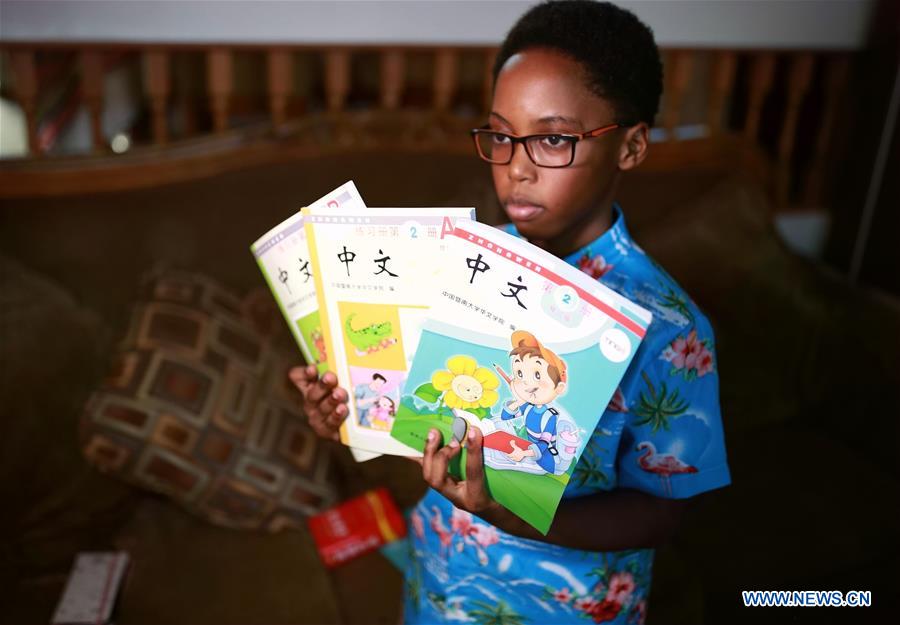
Khaya Njumbe shows his Chinese-learning textbooks in Chicago, the United States, on Sept. 25, 2019. Ten-year-old Khaya Njumbe has been studying Chinese for years, so that when he speaks to the Chinese people in their language, he can go to their hearts. (Xinhua/Wang Ping)
by Xinhua writers Xu Jing, Wan Fang, Yang Haiyun
CHICAGO, Oct. 16 (Xinhua) -- Ten-year-old Khaya Njumbe has been studying Chinese for years, so that when he speaks to the Chinese people in their language, he can go to their hearts.
Citing Nelson Mandela, South Africa's former president, Khaya told Xinhua, "if you talk to a man in a language he understands, that goes to his head. But if you talk to a man in his own language, that goes to his heart."
Earlier this year, Khaya won the top prize in the children's group of a singing contest of Chinese songs in the U.S. Midwest. He was singing two Chinese songs, "When You Are Old" and "The Moon Represents My Heart," after practicing for only two weeks.
Khaya's obsession with the Chinese language started from a TV program teaching basic Chinese when he was two years old. Since then, Khaya has been learning Chinese from YouTube, TV programs and books. "I wanted to learn the most, learn as much as I could while at home."
Khaya's mother, Belinda, still remembers the "Little Bunny," a Chinese lullaby that Khaya sang to her when he was three years old. "He learned it from a TV song contest."
Other pleasant surprises for her were that Khaya also learned to recite Tang-dynasty poems and try Chinese tongue twisters.
Born in Chicago, Khaya lives with his parents in the small town of Lansing in the southernmost of Illinois.
In their house, a big red Chinese knot hangs in the middle of a wall, with two wooden pendants engraved with "Auspiciousness" and "Happiness" in the Chinese language. There are also some flashcards with Chinese characters on the coffee table and a Chinese dictionary on the bookstand.
When Khaya's parents migrated to America from Africa more than 20 years ago, they knew nothing about China except for the Chinese food. They sent him to a Chinese class in Chinatown when he was eight, but one month later Khaya complained that the Mandarin classes were too basic for his level and that the teachers mostly spoke Cantonese.
At Khaya's request, they switched him to Xilin Chinese School, a non-profit Chinese culture center in Naperville in the western suburbs of Chicago.
Now it has been more than two years since Khaya started taking Chinese, mathematics, calligraphy and singing classes at Xilin from 10:00 a.m. to 5:00 p.m. every Saturday.
Khaya said he never felt tired of the whole-day study. "I am just very busy. I really like it, so it feels like it's very short."
Referring to the family's friendship with local Chinese households, Khaya's father, David, said, "I have a Chinese extended family right here."
When asked about his dreams, Khaya said he would like to do biomedical engineering in China.
"I think there will be a lot of business opportunities in the future when I finish school," he said.
And Belinda told him to pick one thing, stick to it and be good at it. She said, jokingly, "My Chinese friends call me a tiger mom."
An electrical engineer himself, David offered his full support. "At this point, he is absorbing everything. So I let him go for it, and our support is all he needs."
Noting that China is one of the major economic powers in the world, David hoped that mastering the Chinese language would give Khaya a big advantage to do business in China in the future.
"China is investing a lot in Africa, where he has relatives. He can help them understand China," he said.